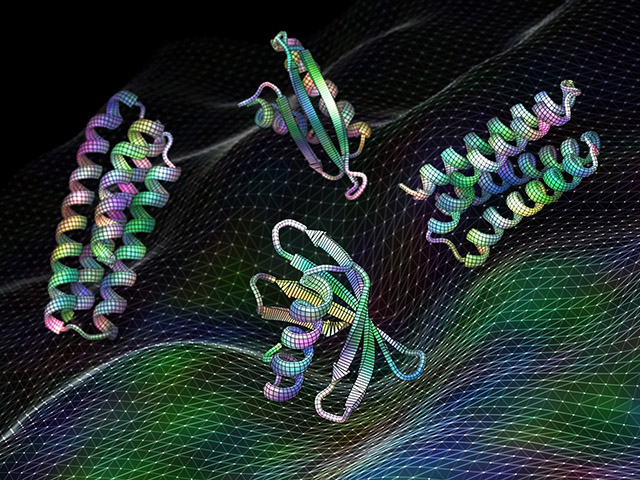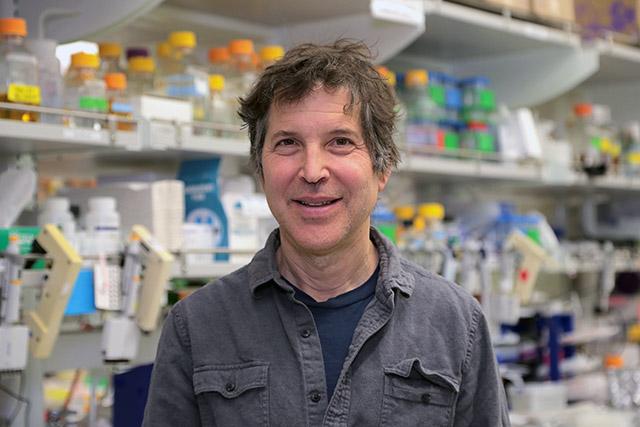
Protein scientists share Frontiers of Knowledge Award
BBVA Foundation honors UW Medicine's David Baker for advancing artificial intelligence in protein design.Media Contact: UW Medicine: Leila Gray, leilag@uw.edu
BBVA Foundation, Spain: Tel. +34 91 374 52 10 / +34 91 374 81 73 / +34 91 537 37 69, comunicacion@fbbva.es
UW Medicine biochemist David Baker is among three scientists named to receive The Frontiers of Knowledge Award in Biology and Biomedicine. The BBVA Foundation is honoring Baker and British scientists Demis Hassabis and John Jumper, both at AI company Deep Mind, for leading parallel efforts that are revolutionizing artificial intelligence for protein design.
Protein molecules are the workhorses of biology and are involved in almost every cellular activity in all living things. The ability to analyze their structure, understand their functions and interactions, and engineer brand new, highly useful proteins not found in nature opens avenues to many medical and other advances.
Baker, who directs the UW Medicine Institute for Protein Design, oversaw the development of RoseTTAFold.

It is a deep learning system that can quickly and accurately decipher the three-dimensional structure of proteins. It can accomplish in a just a few seconds what used to take years of laboratory work. This technology also supports the design of new proteins, created to carry out specific functions. This holds promise for the engineering of new therapies against a variety of diseases, including cancer and infectious illness, as well as applications in energy, environmental, nanotech and other fields.
DeepMind’s CEO Hassabis and chief research scientist Jumper headed the creation of the AlphaFold2 tool, which brought artificial intelligence and deep learning to protein structure prediction and design, and which is powering protein research a variety of medical areas and other bioscientific fields.
The BBVA Foundation promotes world-class scientific research and cultural creation, and the recognition of talent. It is assisted in evaluating nominees for the Frontiers Award in Biology and Biomedicine by the Spanish National Research Council, the country’s premier public research organization. They were joined by an international jury for this category.
According to the selection committee, as reported in the BBVA Foundation news announcement on the work being honored by this year’s award, “Both computer methods rely on a sophisticated machine-learning technique known as deep learning to predict the shape of proteins with unprecedented accuracy, similar to that of experimentally determined structures, and with exceptional speed.”
They added, “This breakthrough is revolutionizing our understanding of how the amino acid sequence of proteins leads to uniquely ordered three-dimensional structures. Scientists are now using these new methods.”
This is an advance, the announcement noted, with huge potential for the development of new treatments against multiple conditions, from combatting the flu virus or COVID-19, cancer cell growth, or malaria parasites, as a few examples.
Baker was born in Seattle. He earned his Ph.D. in biochemistry from the University of California, Berkeley. Hi is currently a Howard Hughes Medical Institute Investigator and the Henrietta and Aubrey Davis Endowed Professor in Biochemistry at the University of Washington School of Medicine, in addition to directing the Institute for Protein Design. He is also an adjunct professor of genome sciences, bioengineering, chemical engineering, computer science and physics at the UW. He has authored more than 570 research papers, holds more than 100 patents, co-founded 11 tech firms, and directs Rosetta Commons, a consortium of labs and researchers working on biomolecular structure predictions and design software. He and his colleagues are also know for their longstanding citizen scientist effort to involve people from a variety of backgrounds and locations in protein design through Rosetta@Home.
In the BBVA Foundation award announcement, Baker described the revolution in purpose-designed proteins to advance the creation of new drugs and vaccines. He said that the latest RoseTTAFold version even allows for the design of proteins from simple descriptions, similar to the DALL-E system that generates images from text prompts.
“So, for example, you can tell RoseTTAFold: design a protein which blocks this flu virus protein, or design a protein which will block these cancer cells,” he said in the BBVA Foundation news release. “RoseTTAFold will then make those proteins. We’ve made them in the lab, and we find that they have exactly those functions.”
An anti-coronavirus vaccine created with RoseTTAFold has been clinically tested and distributed in South Korea. New purpose-designed anti-cancer medicines are being evaluated in human clinical trials. There are plans for a nasal spray that protects against COVID-19 and work underway on an RSV vaccine, a universal flu vaccine, and ideas for a vaccine against a family of viruses related to SARS-CoV-2.
“We believe that almost all of medicine will be transformed by the protein design revolution,” said Baker. “Most medicines today are made by making small modifications to the proteins which already exist in nature. Now that we can design completely new proteins, we can develop much more improved, more sophisticated medicines that, for example, can treat cancer without the side effects, be made very quickly upon the outbreak of a new pandemic, and in general will be more precise and more robust.”
RoseTTAFold and AlphaFold2 are freely available to the scientific community. Upgrades have practically equalized the computing times required by each.
Although these AI tools have not entirely supplanted experimental methods, they are starting to transform both the field of protein design and biological research more generally.
For details about UW Medicine, please visit http://uwmedicine.org/about.
